|
|
|
Sort Order |
|
|
|
Items / Page
|
|
|
|
|
|
|
| Srl | Item |
| 1 |
ID:
080633
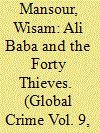

|
|
|
|
|
| Publication |
2008.
|
| Summary/Abstract |
The twelfth-century Abbasid Caliphate was riddled with criminal gangs, corrupt officials and shadowy figures who spanned both, with underworld figures such as the notorious Karahanli family able to operate with virtual impunity. In this context, rather than being a fable in which good triumphs over evil, 'Ali Baba and the Forty Thieves' one of the later narratives of The Arabian Nights, depicts organised crime in Baghdad during the twelfth century and how a more cohesive gang can replace another, using ruthlessness and guile. As such, a close analysis of the tale and also those issues it does not discuss suggests striking continuities between medieval and modern organised crime.
|
|
|
|
|
|
|
|
|
|
|
|
|
|
|
|
| 2 |
ID:
108100
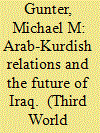

|
|
|
|
|
| Publication |
2011.
|
| Summary/Abstract |
The Iraqi Kurds now not only possess their most powerful regional government since the creation of Iraq following World War I (the Kurdistan Regional Government-krg), but also play a prominent role in the Iraqi government in Baghdad, holding the posts of president, foreign minister and several other cabinet positions. After a great deal of wrangling, the Kurds managed to maintain their strong position in al-Maliki's new Baghdad government finally cobbled together in December 2010. This dual governmental role stood in marked contrast to the situation that existed before the events of 1991 and 2003, when the Kurds were treated as second class citizens and worse. The ultimate question is for how long this unique Kurdish position of strength will last. Many Arabs still resent the Kurdish claims to autonomy as a challenge to the Arab patrimony and see a federal state for the Iraqi Kurds within Iraq as simply a prelude to secession forced upon the Arabs at a moment of temporary weakness following the war in 2003. When will the Iraqi Arabs organise themselves and start trying to reduce the power of the Kurds again? This paper will analyse this developing situation and tentatively conclude that the two sides are most likely to continue to coexist in a troublesome but peaceful relationship.
|
|
|
|
|
|
|
|
|
|
|
|
|
|
|
|
| 3 |
ID:
093220


|
|
|
| 4 |
ID:
178100
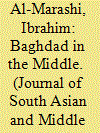

|
|
|
| 5 |
ID:
138777


|
|
|
|
|
| Summary/Abstract |
The Iraqi Insurgency (2003–2011) has commonly been characterized as demonstrating the tendency for violence to cluster and diffuse at the local level. Recent research has demonstrated that insurgent attacks in Iraq cluster in time and space in a manner similar to that observed for the spread of a disease. The current study employs a variety of approaches common to the scientific study of criminal activities to advance our understanding of the correlates of observed patterns of the incidence and contagion of insurgent attacks. We hypothesize that the precise patterns will vary from one place to another, but that more attacks will occur in areas that are heavily populated, where coalition forces are active, and along road networks. To test these hypotheses, we use a fishnet to build a geographical model of Baghdad that disaggregates the city into more than 3000 grid cell locations. A number of logistic regression models with spatial and temporal lags are employed to explore patterns of local escalation and diffusion. These models demonstrate the validity of arguments under each of three models but suggest, overall, that risk heterogeneity arguments provide the most compelling and consistent account of the location of insurgency. In particular, the results demonstrate that violence is most likely at locations with greater population levels, higher density of roads, and military garrisons.
|
|
|
|
|
|
|
|
|
|
|
|
|
|
|
|
| 6 |
ID:
090181
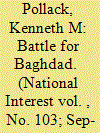

|
|
|
|
|
| Publication |
2009.
|
| Summary/Abstract |
The scheming had gone on for hours. The Iraquis were from a half dozen different political groupings, some secrarian, some secular. It was Baghdad, it was February 2009 and it was less than a month after Iraq's provincial elections.For our hosts, the purpose of the dinner was to assure me and a colleague that their coalition had enough people on its side to oust Prime Minister Nuri Kamal al-Maliki in a vote of no confidence. It was one of many such meals we attended on that trip with Iraqi friends determined to prevent Maliki from spinning his recent electoral victories into absolute power.
|
|
|
|
|
|
|
|
|
|
|
|
|
|
|
|
| 7 |
ID:
125991
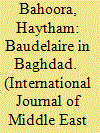

|
|
|
|
|
| Publication |
2013.
|
| Summary/Abstract |
During a revolutionary period of cultural production and anticolonial political commitment in 1950s Baghdad, the modernist poet Husayn Mardan was put on trial for his "obscene" collection entitled Qasa?id ?Ariya (Naked Poems). Heavily influenced by Baudelaire, Mardan's poetics provide a revolutionary paradigm focused on the gratification of the corporeal. This paper considers how Mardan's poetry, largely marginalized from the canonized modernist Arabic poetic tradition, registers resistance to an increasingly rationalized and bureaucratic social order through a transgressive poetics that displace the political onto the body. Lampooning social uprightness and middle-class sterility, Mardan's poems encourage sexual licentiousness, embrace the space of the brothel, and celebrate filth and germs. Through a consideration of Mardan's appropriation of Baudelaire, this essay theorizes the translation and transformation of Baudelaire's paradigmatic literary representations of modernity into the context of a modernizing Baghdad and therefore historicizes the appearance of modernist aesthetics in a non-European space.
|
|
|
|
|
|
|
|
|
|
|
|
|
|
|
|
| 8 |
ID:
108254


|
|
|
|
|
| Publication |
2011.
|
| Summary/Abstract |
Some postmortems of the Bush Administration's pre-Iraq war decision-making have focused on a dysfunctional National Security Council (NSC) structure as the major reason for the lack of a thorough strategic assessment prior to the March 2003 invasion. Other academic and journalistic accounts have focused on a lack of a first rate conceptual thinker at the top levels of the Bush Administration as an important cause of the strategic shortcomings in Iraq decision-making. This article will assess the relative impact of decision-making structure versus quality of strategic leadership in explaining poor performance in the first five years of the Iraq war.
|
|
|
|
|
|
|
|
|
|
|
|
|
|
|
|
| 9 |
ID:
118890
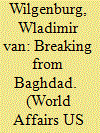

|
|
|
| 10 |
ID:
027124


|
|
|
|
|
| Publication |
London, Hamish Hamilton, 1972.
|
| Description |
xvi, 179p.hbk
|
| Standard Number |
24102143X
|
|
|
|
|
|
|
|
|
|
|
|
Copies: C:1/I:0,R:0,Q:0
Circulation
| Accession# | Call# | Current Location | Status | Policy | Location |
| 011087 | 956.95/JOH 011087 | Main | On Shelf | General | |
|
|
|
|
| 11 |
ID:
129426
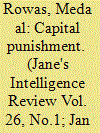

|
|
|
| 12 |
ID:
096970
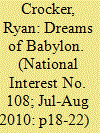

|
|
|
| 13 |
ID:
138313
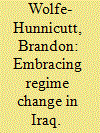

|
|
|
|
|
| Summary/Abstract |
This article analyzes the U.S. foreign policy response to the 1958 Free Officers’ Revolution in Iraq. I look specifically at the question of the U.S. involvement in the 1963 coup d'état that first brought the Ba‘th party to power. Given the limits of available documentation, I leave the question of CIA involvement to one side and focus on the underlying logic of the U.S. foreign policy toward Iraq between 1958 and 1963. I show that while the American policymakers were deeply divided between a hard-line interventionist faction and a more accommodating anti-interventionist faction, by the middle of 1962, the Kennedy administration embraced regime change as the U.S. policy objective in Iraq. I further argue that it was the perceived threat to Iraqi oil installations, and not the fear of a Communist takeover, that pushed the American policy to embrace a policy of regime change.
|
|
|
|
|
|
|
|
|
|
|
|
|
|
|
|
| 14 |
ID:
130741


|
|
|
|
|
| Publication |
2014.
|
| Summary/Abstract |
Isaac Bar Moshe (1927-2004) was born in Baghdad and immigrated to Israel in 1950. This article deals with his literary world, which is split between realism on the one hand and fantasy, mysticism and dreams on the other, with both these planes reflecting his perspective on various existential questions. The article focuses on the short stories in his book Behind the Wall (1973), which, like many of his other works, are largely anchored in his private life and depict a bleak reality, with dreams and fantasy offering the only hope of escape into a better, more spiritual world. The article concludes with an analysis of Bar Moshe's stories in terms of the three functions of fantasy - 'recovery, escape and consolation' - as formulated by writer and philologist J.R.R. Tolkien in his book Tree and Leaf.
|
|
|
|
|
|
|
|
|
|
|
|
|
|
|
|
| 15 |
ID:
109579


|
|
|
|
|
| Publication |
2011.
|
| Summary/Abstract |
Most bargaining models of war suggest that the absence of ex-ante uncertainty about the outcome of fighting should lead to negotiated outcomes rather than military conflict. Nevertheless, relatively weak states still refuse demands from dominant powers in many cases. This paper tests several explanations for this phenomenon. James Fearon's account of rationalist explanations for war suggests two reasons states might resist militarized demands even if there is little or no chance of military victory. First, the weaker state might not concede if the stronger state's threat is not credible. Second, guerrilla resistance to enemy occupation might create a commitment problem for the stronger state if it could impose costs that exceed the value of the stronger state's objectives. Alternative explanations that do not assume the state behaves as a unitary rational actor focus on special features of state preferences, such as the importance attached to political sovereignty and territorial integrity, or on the difficulties state institutions might pose for making the policy changes necessary to concede the more powerful state's demands. Empirical analyses of MID and ICB data point to the importance of both rationalist claims about threat credibility and alternative arguments about state preferences.
|
|
|
|
|
|
|
|
|
|
|
|
|
|
|
|
| 16 |
ID:
099904
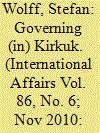

|
|
|
|
|
| Publication |
2010.
|
| Summary/Abstract |
This article focuses on the dynamics of the process of settling the status of Kirkuk, principally within the framework of the current Iraqi constitution of 2005 and the United Nations Assistance Mission for Iraq proposals of 2009, taking into consideration the broader local, national, regional and international context in which such a settlement has to be achieved. The article proceeds in four steps. Beginning with a conceptual clarification of the stakes and remedies associated with territorial disputes, it gives a broad overview of the three principal forms in which such disputes occur and illustrates this with pertinent examples of past disputes and their settlement, using this as an empirical basis for discussing the general dimensions of territorial dispute settlements and the factors that determine their precise nature in different cases. This is the background against which the following section contextualizes the situation in Kirkuk. Based on personal interactions with key interlocutors from all of Kirkuk's communities and key Iraqi and external players and analysts, the article examines the three (im-) balances of grievances, demands and power in and around Kirkuk that are essential for understanding the dynamic underlying any efforts to resolve the dispute in and over the province. Taking as a baseline the options currently available under the 2005 constitution of Iraq and the recommendations of the 2009 UN Report on Disputed Territories, it offers some observations on areas of possible compromise centred on power sharing in Kirkuk and status of Kirkuk vis-à-vis Baghdad and Erbil.
|
|
|
|
|
|
|
|
|
|
|
|
|
|
|
|
| 17 |
ID:
113526
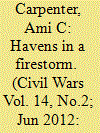

|
|
|
|
|
| Publication |
2012.
|
| Summary/Abstract |
The invasion of Iraq caused the collapse of more than one regime, setting in motion citywide and neighborhood-level changes that ruptured the stability of sectarian relations. Surprisingly, some areas of the city were able to prevent this rupture and keep sectarian militias at bay. This article is based on a year-long comparative research of neighborhoods in Baghdad wherein residents either (1) rejected sectarianism and mobilized to protect their neighbors from attacks; or (2) adopted sectarian attitudes and behaviors. In this small-n study, the trajectory of conflict escalation and coping strategies were documented in the narratives of residents and analyzed through the conceptual lens of resilience and regime shifts. The results suggest five research directions for deeper analysis of resilience to violence.
|
|
|
|
|
|
|
|
|
|
|
|
|
|
|
|
| 18 |
ID:
139129


|
|
|
|
|
| Summary/Abstract |
This article investigates the German cultural diplomatic efforts in the Ottoman Empire between 1900 and 1918 and the example of the German so-called Propagandaschule in Baghdad. The article argues that contrary to recent scholarship, the German Empire had a considerable and well-designed secular-based cultural diplomacy programme, especially in the Ottoman Empire. This finding is important for the social history of the Arab provinces of the late Ottoman Empire, as it gives the local population, especially the Muslim part, a much stronger agency in daily life than recently argued. The finding breaks with the assumption that the local population only had the Ottoman state schools or western missionary schools to choose from. The Muslim population in particular favoured the possibility of secular education.
|
|
|
|
|
|
|
|
|
|
|
|
|
|
|
|
| 19 |
ID:
107154
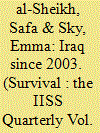

|
|
|
|
|
| Publication |
2011.
|
| Summary/Abstract |
The US-led invasion of Iraq in 2003 had a traumatic effect on Iraqi society, causing it to break down into different armed groups that at times fought the US-led Coalition, the new government, members of other sects and even members of the same sect in a nation-wide conflict that claimed the lives of well over 100,000 Iraqis. While this violence has since decreased, Iraq's stability gains remain fragile, and the country's future is uncertain. To understand why there was so much violence in Iraq after 2003, and why the violence eventually decreased, it is important to examine the contending perspectives of the different groups, in particular Sunni insurgents, the central government in Baghdad and the followers of Shia leader Moqtada al-Sadr (known as Sadrists).
|
|
|
|
|
|
|
|
|
|
|
|
|
|
|
|
| 20 |
ID:
099903
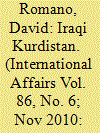

|
|
|
|
|
| Publication |
2010.
|
| Summary/Abstract |
In August 2010, the United States officially ended the combat mission of its military forces in Iraq and withdrew all but 50,000 of its troops from the country. Iraqi Kurds now contemplate the implications of the looming withdrawal of the remaining 50,000, scheduled for the end of 2011. While Arab-Kurdish relations in Iraq face the risk of serious deterioration, the US military withdrawal will probably not greatly affect the internal politics of Kurdistan. Given the de facto autonomy the region has enjoyed since 1991 and the Kurds' resulting experience with self-rule, Iraqi Kurdistan never suffered from the post-2003 security and political vacuums plaguing the rest of the country. As a result, no more than a few hundred coalition troops were stationed in Iraqi Kurdistan (and no coalition casualties have occurred there since 2003), with governance and security remaining completely in the hands of the Kurdish authorities.
While important centrifugal tendencies do exist in Iraqi Kurdistan and are discussed here, the region will most likely continue to deal with Baghdad and the rest of the outside world with the united voice it cultivated after 2003. US civilian personnel and advisers will also remain in Iraq after the military withdraws, which offers the possibility of assisting Iraqi Kurdistan to overcome obstacles in order to achieve better, more transparent governance. A continuing American diplomatic engagement in Iraq also offers the possibility of helping Kurdistan further institutionalize its autonomy vis-à-vis Baghdad and neighbouring states.
|
|
|
|
|
|
|
|
|
|
|
|
|
|
|
|
|
|
|
|
|